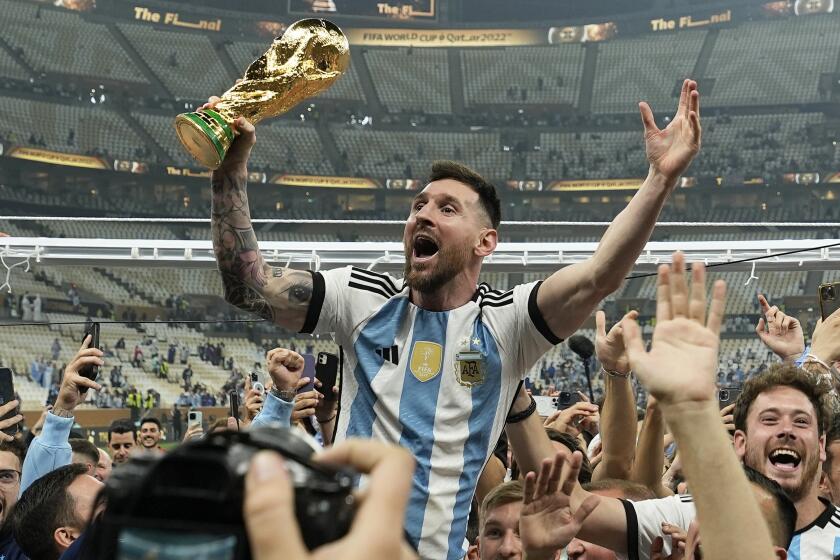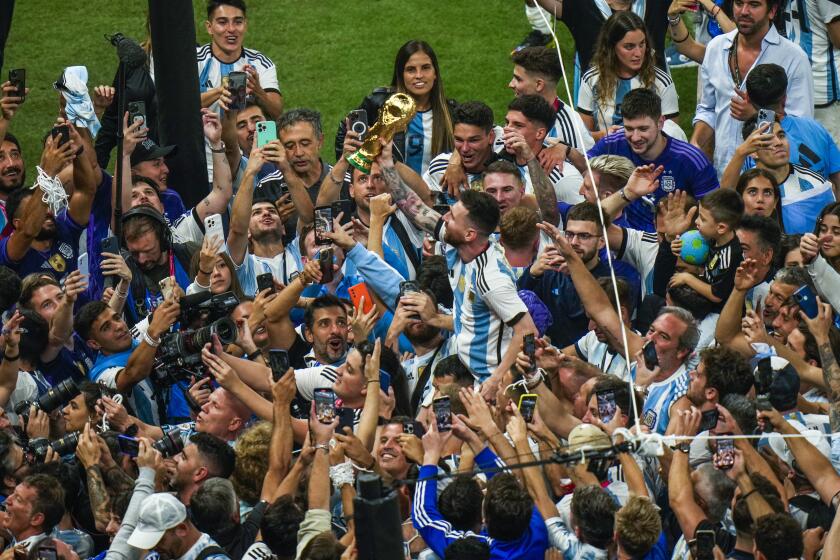Lionel Messi and Argentina defeat France in penalty kick shootout for World Cup title
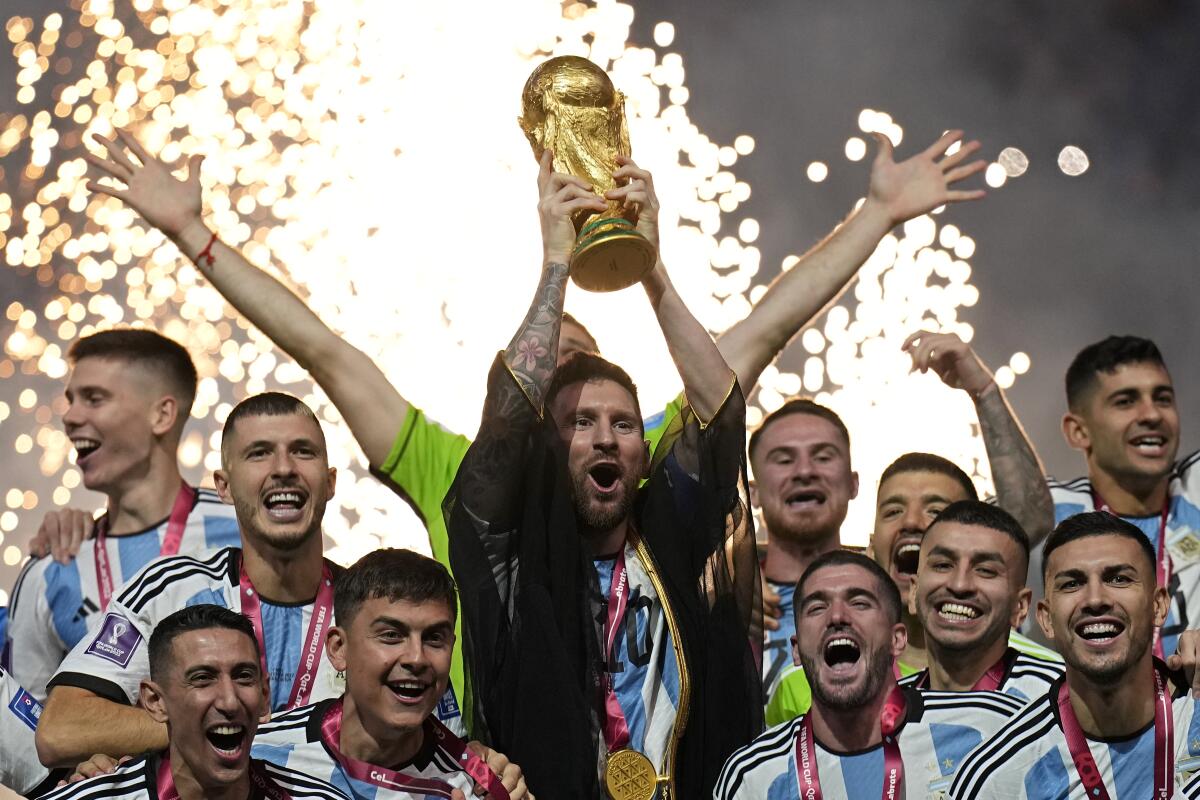
- Share via
LUSAIL, Qatar — When Sunday’s World Cup final finally ended, there was a president on one side of the field and a king on the other.
The president was France’s Emmanuel Macron, who was commiserating with Kylian Mbappe, his country’s young superstar and a player who has known little but success in his short career. The king was the aging Lionel Messi, who finally won the prize that had eluded him during a long and storied career.
It took six goals, 120 minutes and a four-round penalty-kick shootout to separate one from the other. But when it was finally over, Messi was world champion, assuming the crown Mbappe had worn the last four years.
“It’s just crazy that it became a reality this way,” Messi said. “I craved for this so much. I knew God would bring this gift to me. I had the feeling that this [World Cup] was the one.”
Lionel Messi found redemption, leading Argentina to its first World Cup victory in 36 years during a Qatar tournament that often stepped into controversy.
There was no final whistle to mark the end of the game, nor was one needed. Instead, it ended with the sound of 88,966 fans screaming — most of them for Argentina — when Gonzalo Montiel’s penalty try hit the back of the net.
At midfield Messi dropped to his knees and was immediately engulfed by teammates, most smiling, some crying and others, like Messi, doing both. After several long, suffocating minutes in the middle of the scrum, he broke free and headed for the sideline, arms held aloft as he waved to his family.
In Buenos Aires, tens of thousands of people celebrated in the streets.
“I know it’s just a football game, but it’s a World Cup final,” Argentine coach Lionel Scaloni said. “For us in Argentina, it’s something more.”
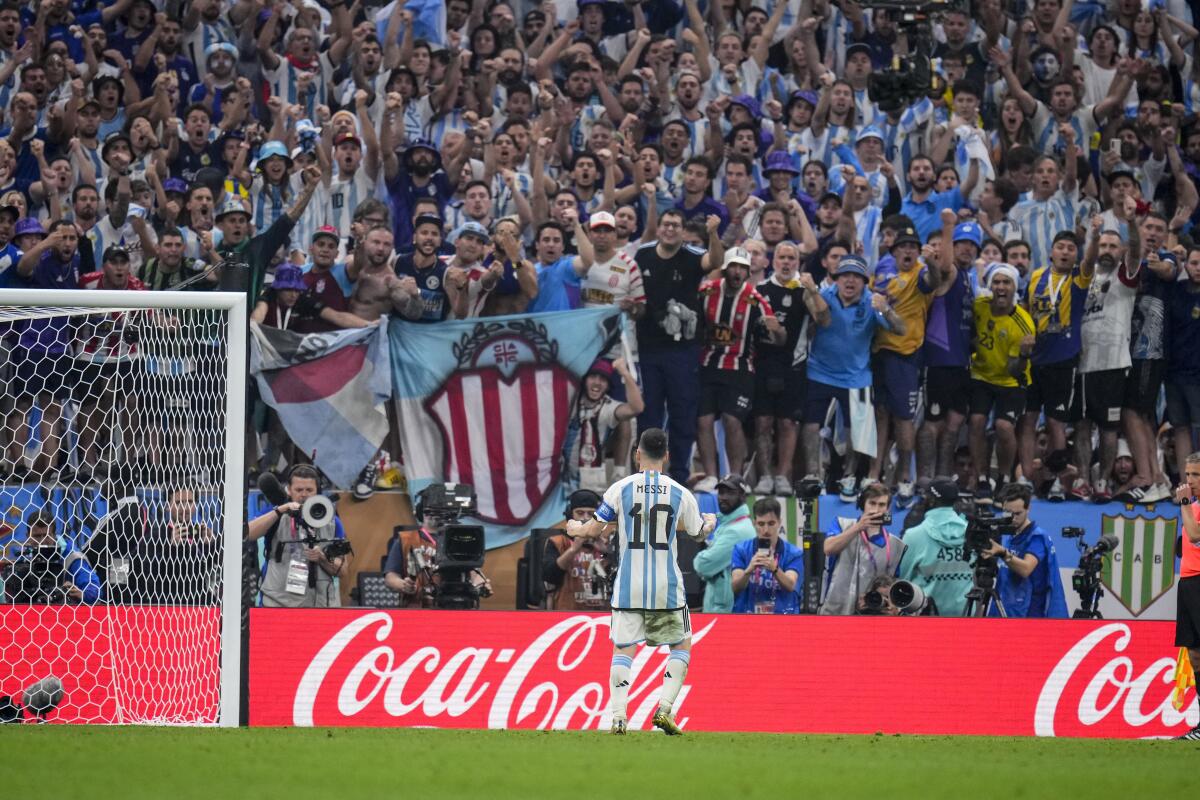
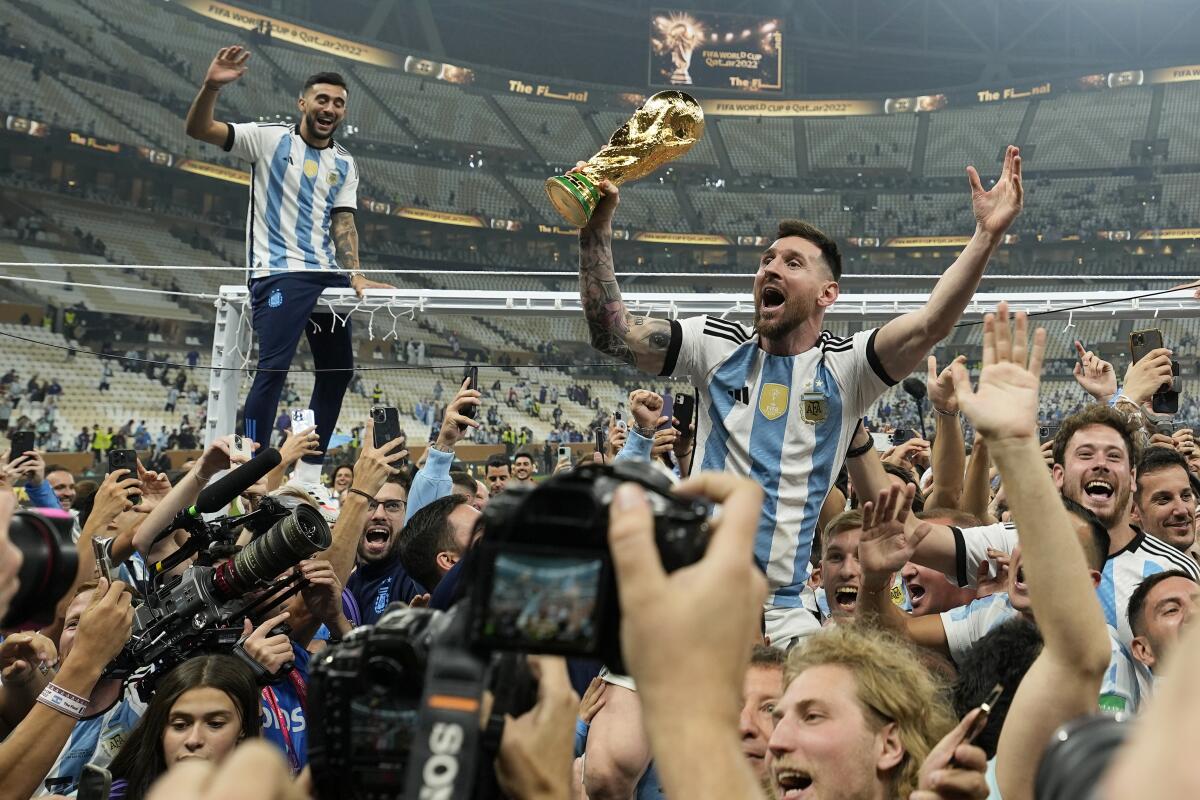
During the postgame awards ceremony, when he was called up to receive the Golden Ball as the tournament’s outstanding player, Messi paused as he headed off stage to place a gentle kiss atop the 14-inch solid gold World Cup trophy, the final recognition he needed to secure his place as the greatest player of all time.
A seven-time world player of the year, Messi had won virtually everything there was to win except the World Cup, and that had kept him partially hidden in the shadow of the late Diego Maradona, who led Argentina to its last world championship in 1986. Without a title of his own Messi didn’t measure up, many thought, a feeling that was reinforced before Sunday’s game when footage of Maradona played on the stadium scoreboards, drawing thunderous applause from the crowd.
After the game, those Maradona fans were finally clapping for Messi.

Sunday’s final, the fourth in the last five World Cups to go to extra time, unfolded more like a heavyweight title fight than a soccer game, with both teams throwing knockout punches, but neither side going down.
Argentina delivered the first two blows, taking a 2-0 first-half lead on goals from Messi and Ángel Di María, only to see Mbappe punch back, pulling France even in the final 10 minutes of regulation, scoring first on a penalty kick, then tying the score less than two minutes later on a spectacular individual effort.
It was the second time in three games that Argentina had given away a 2-0 lead after the 70th minute. But neither Messi nor Mbappe, teammates at French club Paris-Saint Germain, were done.
Messi, 35, who announced earlier this year this would be his last World Cup, put Argentina back in front again three minutes into the second extra-time period, bumping in the rebound of a Lautaro Martínez shot that fell at his feet. The goal was Messi’s seventh in the tournament and the sixth that had given Argentina a lead. His two goals Sunday also made him the first player in World Cup history to score in all five rounds of a World Cup: the group stage, the round of 16, the quarterfinals, semifinals and final.
For the first time, the FIFA World Cup is heading to the Middle East for a fall showcase. Here is The Times’ complete coverage of the 2022 Qatar World Cup.
But that wasn’t enough, with Mbappe tying the score again eight minutes later, converting another penalty kick after Montiel was called for a handball in the box. That made Mbappe the second player with a hat trick in a men’s World Cup. Combined with his goal in the 2018 final, it made him the only man to score four times in the final.
That score, the 172nd of the tournament, also broke the overall World Cup record for goals.
“It was the World Cup of records tonight,” France coach Didier Deschamps said. “And Kylian really left his mark on this final. Unfortunately, he didn’t leave the mark he would have liked.”
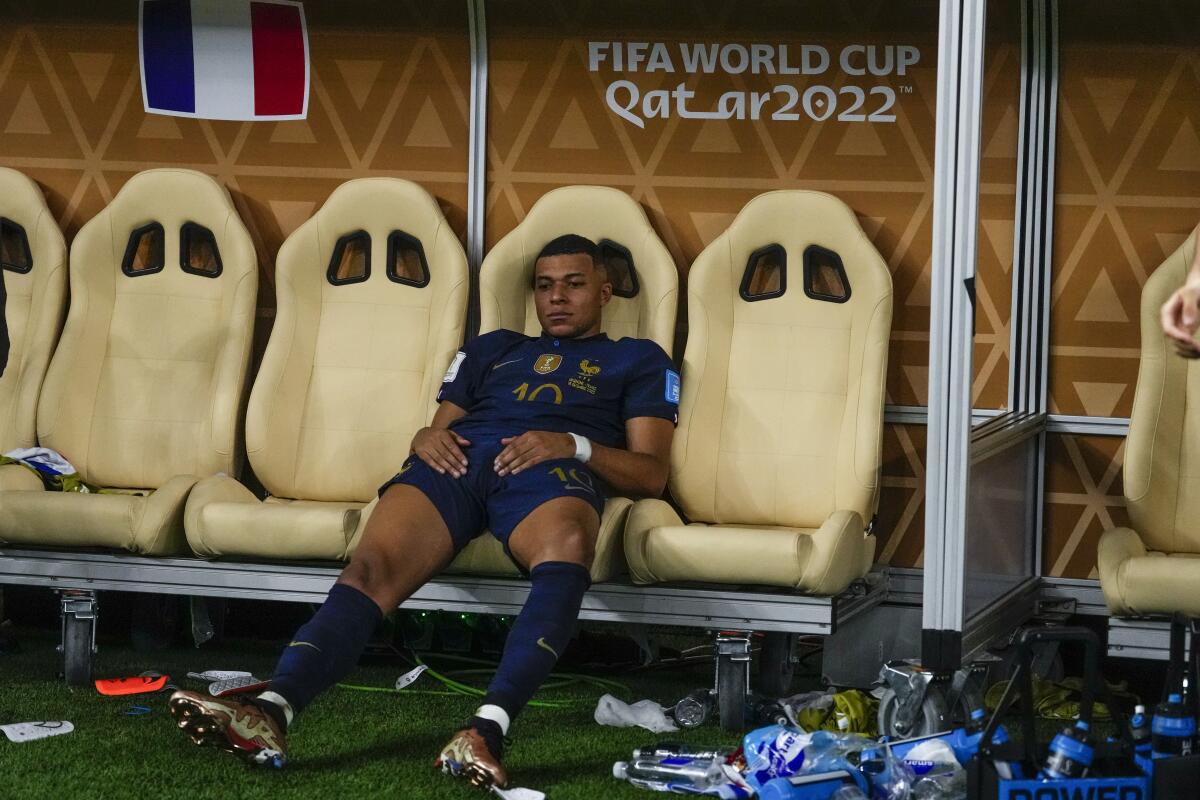
Both Mbappe and Messi made their tries to open the shootout, but then the momentum shifted for the final time when Argentina keeper Emiliano Martínez, the Gold Glove winner as the tournament’s best goalie, guessed correctly to start the second round, diving in front of Kingsley Coman’s shot and smothering it. In the next round France’s Aurelien Tchouameni pushed his try wide of the left post and when Montiel made his, France’s reign was over and its quest to become the first men’s team to win back-to-back titles in 60 years was done.
“That match was complete insanity,” said Scaloni, who showed up at his postgame news conference wearing a blue-and-white national team jersey with a third star on the left chest, signifying Argentina’s third World Cup title.
About 20 minutes after it ended, the Argentine players filed across the stage in a slow parade to receive their winners’ medals from FIFA president Gianni Infantino. Messi, as captain, went last and after having the medal hung around his neck, he led Infantino and Sheikh Tamim bin Hamad Al Thani, the emir of Qatar, to the World Cup trophy. There Infantino and the emir draped a Bisht, a black and gold Qatari robe, over Messi’s sweat-soaked and grass-strained uniform, then finally, slowly, tauntingly handed him the most cherished trophy in team sports.
As Messi cradled it over to his teammates, the rim high above Lusail Stadium exploded with fireworks.
“It took so long, but here it is,” Messi said. “We suffered a lot, but we managed to do it.”

